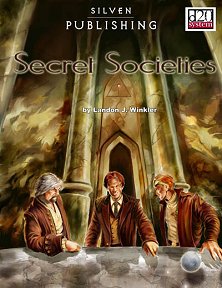
Intrigue. Who you know rather than what you know. Sinister conspiracies. Patrons who employ you for strange purposes that somehow further their ends, only you don't know what they are. Funny handshakes or greeting phrases. Sound familiar? Maybe there's a secret society or two knocking around in your game world. Never mind the real world, there are plenty there...
This is a sourcebook aimed primarily at GMs (while this book is in the Dungeons & Dragons section, most of it transfers well to any genre of role-playing and - D20 rules bits aside - irrespective of the game mechanic you are using. Whether you design your own settings, use published ones or run a contemporary or historical campaign in the 'real world' you'll find that the odd secret society or two will enhance your game, even if they don't become pivotal... and this book will help you set up and run them convincingly.
The book starts with an introduction, giving an overview of the contents and suggesting that a GM dips into it, looking at the bits most relevant to the game he's planning, rather than reading it straight through. There are both real-world secret societies that can be transplanted wholesale into your setting, and ideas and rules for how to design your own if you prefer. Hmmm... Mossad in your next D&D game?
Chapter 2: Secret Societies in Gaming provides an overview of how to use one (or many, the things tend to multiply once they gain a foothold!) within the confines of an RPG. It starts off with general aspects of the underlying concepts involved, and how to have the society working behind the scenes but eventually revealing more of it to your players. It then moves on to look at more specific aspects involved depending on whether your game is fantasy, contemporary or science-fiction - with the note that if it doesn't fit handily into one of these genres, read all 3 and skim out the bits that fit. Next it moves back to more general topics - how much influence or control do secret societies have in your setting, and whether there is one or several exerting that influence. Finally, it looks at how the presence of secret societies can have a direct influence on the characters, what roles they can play and what challenges they can present. If you are considering whether or not to make use of secret societies, it is well worth reading this chapter: it should help you make up your mind as to whether or not they will be right for the game you are planning, your GMing style and the players who will be participating.
Chapter 3 is 'Six Societes in Depth' and looks at six well-known real world organisations. They could be used as-is, or with the serial numbers filed off, or just to provide ideas for what your own societies might be up to and how they are organised and operate. To help with this, each is accompanied by a fictional secret society inspired by the 'real' one, ready for you to use or to in turn be inspired yourself. The featured societies are the Assassins, Aum Shinrikyo, the Freemasons, the Knights Templar, Mossad and the Thule Society. Apart from those running very accurate historical or contemporary games, it is likely that the spin-off ideas and concepts will be more useful than the actual societies - and also less likely to run the risk of offending, say, a genuine Freemason who might be playing in the game.
Chapter 4: Societies in Brief continues the theme, looking in much less detail at a whole bunch of real world organisations. Again, you may wish to use them 'as is' or use the concepts as a basis for designing your own society that is more in keeping with your setting.
Next, Chapter 5 looks at creating your own secret societies from the ground up, as well as a few brief notes on converting a real one to suit your needs (by and large unhelpful or restating what's been said before). The actual complete creation bit is more interesting, with some ideas to think about when doing the overall design and tables that can be used to flesh out the details either by giving you ideas or even by just rolling randomly on them. One key factor for making your secret society work well is making sure that any society's members have realistic motivations within the context of your setting. The best one is that they genuinely believe in what they are doing - either because they think it's 'right' or because they can see personal or other advantage in it. Even people who come over to the rest of us as completely 'evil' usually have some good reason - in their own minds - for how they act. (Go read Evil if you want to know more about this interesting ethical question from a role-playing standpoint.) You also need to figure out their traditions and beliefs, and what 'signature' methods they have for pursuing their aims and punishing those who cross them. Oh, and where do they get their money from? There's a lot of food for thought here, but it does suggest that, like most things, if you want to design realistic and believeable secret societies for you games, it requires some hard work and thought.
Overall, this is a fascinating book to read and comes up with some good ideas for how secret societies can enhance a role-playing game. Virtually all of the material is of use even if you don't run a D20 game. About all it lacks is some good reference material - but reasonable skill with a search engine ought to find you plenty more resources once your appetite for conspiracies has been whetted here!
Return to Secret Societies page.
Reviewed: 9 April 2006

